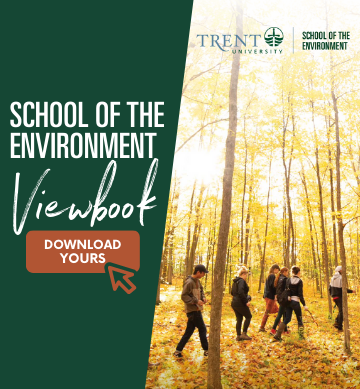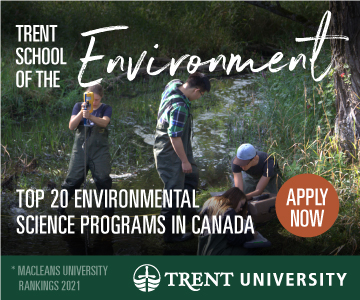Environmental & Resource Science / Studies
In these ECO Canada-accredited environmental programs, you have the flexibility to design a degree that fits your unique interests. Choose to pursue Bachelor of Arts (B.A.) in Environmental & Resource Studies or a Bachelor of Science (B.Sc.) in Environmental & Resource Science. You can also expand your academic journey with a joint major in ERS (science or studies) and one of 30+ other honours degree programs. B.A. students explore topics in environmental law, planning, policy, or business and the environment, while the B.Sc. program offers students advanced scientific understanding of the environment and builds industry-level competencies. No matter which path you take, you’ll benefit from the many resources and opportunities available to undergraduates at one of Canada’s most renowned environmental institutions.
Accelerated Masters
Fast-track your education, by earning your M.Sc. in Environmental & Life Sciences in only 12-16 months after graduating from your honours B.Sc.
Degrees Offered:
- B.A. (Honours)
- B.Sc. (Honours)
Locations:
- Peterborough
Specializations:
Resume Boosters:
- Benefit from access to the broadest range of environmental courses available at any Canadian university, many with hands-on learning components offering practical fieldwork experience in Trent’s network of nature areas or with local communities
- Lead your own undergraduate research project to deepen your knowledge of the environment in the natural world – from wetlands to wildlife sanctuaries and farms to forests – or in social, cultural, political, and humanitarian contexts
- Put your education into action getting involved with a variety of campus initiatives, such as growing food in the on-campus gardens or driving sustainability initiatives
- Study abroad with a variety of international research placement opportunities, including studying in Iceland or the UK
- Learn from several Canada Research Chairs affiliated with the Trent School of the Environment with expertise in areas of climate change, carbon sequestration, urban agriculture, geoscience, ecology and evolution, and carbon culture

"It's an amazing program, and the people at Trent make the experience even more amazing."
Career Paths:
Featured
Ecologist
Biologists and related scientists conduct basic and applied research to extend knowledge of living organisms, to manage natural resources, and to develop new practices and products related to medicine and agriculture. They are employed in both laboratory and field settings by governments, environmental consulting companies, resource and utilities companies, chemical, pharmaceutical and biotechnical companies and health and educational institutions.
Career Opportunities
- Environmental Scientist
- Ecologist
- Environmental Consultant
- Energy Analyst
- Sustainability Researcher
- Environmental Manager
- Renewable Energy Developer
- Remediation Specialist
- Environmental Activist
- Park Warden
- Environmental Risk Assessor
- Fisheries Ecologist
- Environmental Policy Advisor
Popular Courses:
- Environmental Science and Politics
- Greening the Campus
- Canadian Environmental Policy
- Natural Resource Management
- Air Pollution
- Ecology and the Management of Wetland Systems
- Environment and Development
- Community-Based Natural Resource Management
- Environmental Professional Practice

Admission Requirements
More Requirements
Discover Ontario's
#1 Undergrad University
Where award-winning architecture meets state-of-the-art research facilities and dynamic student spaces.
Visit TrentReady to Take the Next Step?
Tell us more about yourself and we’ll tell you all the reasons you belong at Trent.
Stay in Touch


